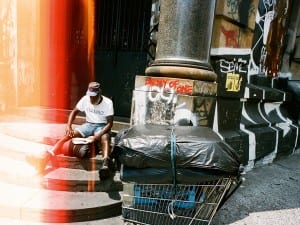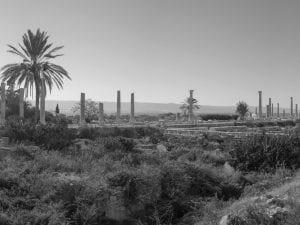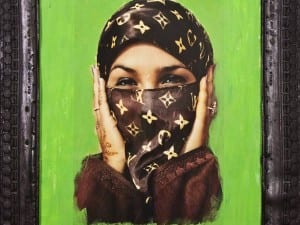The Harbourfront Centre in Toronto presents a collection of works from around the
globe for World Stage, developing dialogues between cross-cultural performance.
Toronto is one of the most multicultural cities in the world, so it is appropriate that it plays host to the World Stage festival. Tina Rasmussen is the Artistic Director of the festival and explains that, since World Stage was started in 1986, ,its mission has been “to help shape the conversation that the city has about itself and its place in the world.” In a city where more than 150 languages are spoken every day, and conversations often cross international boundaries, Toronto’s global position is undeniable in creating a valuable cross-cultural dialogue. World Stage hopes to extend that dialogue further and this season’s selection will be one of the most diverse yet, with works from Canada, Germany, Côte d’Ivoire, Brazil, China, Norway, Belgium, Portugal and the Netherlands.
This collaboration across borders is nothing new in theatre: World Stage has been bringing performers from different countries together for over 25 years and many other festivals throughout the world pride themselves on doing the same thing. One of the most well-known of these is, of course, the Edinburgh International Festival, taking place every August, but there are many others including LIFT in London and PuSh in Vancouver. The way that theatre travels around the globe is changing: in a society where it is easier to share stories across continents, people are becoming interested what it means to be part of this international audience.
Most of the pieces on show at World Stage deal with some element of identity and belonging; they question our position in society and in human culture, and raise notions of responsibility. Some of the works are provocative and ask the audience to re-evaluate their perceptions of the world: “There are a lot of canonical, elemental stories: new reflections on family, on nations, on the unimaginable.” One fascinating production, Othello, c’est qui (Othello, who’s that), which is the result of a collaboration between Germany and Côte d’Ivoire, is staged in French and English and explores a confrontation between two cultures. This investigation into the role of Othello on the Western stage in contrast with his status in Africa, where he is unknown, offers an uncompromising reflection on perceptions of culture between cultures. The show also challenges the audience’s role as witness and accomplice in perpetuating sterotypes across cultures and asks them to reconsider their acceptance of certain theatrical tropes.
As Rasmussen asserts: “Witnessing concerns responsibility.” What are the responsibilities of the witness and how much are they complicit in what takes place on stage? The members of She She Pop, a progressive German performance collective, are certainly not shy about asking the audience to witness and observe. In their presentation of She She Pop & Their Fathers: Testament, the performers and their fathers stand in just their underwear, literally stripping themselves down to discuss their intimate and varied experiences of the father/child bond. The very word “testament” means to “bear witness to”, as well as relating to the disposition of one’s property, and both definitions are relevant here, in She She Pop’s King Lear inspired work.
King Lear is actually explored twice in the festival: once in She She Pop & Their Fathers: Testament and again in Philip McKee’s LEAR , with Canadian stage legend Clare Coulter. Notions of fatherhood, family and responsibility are played out in an innovative and challenging way in McKee’s surprising rendition of the Shakespearean play, while She She Pop use the premise of King Lear to explore their own relationships with their aging fathers. Both performances offer a sincere and honest look at decline, decay and generational change, whilst also exploring the family dynamic from a female perspective.
Power and status are key themes in this chaotic display of the United Nations and in other works in this international collection. Belgian-Portuguese duo Pieter Ampe and Guilherme Garrido bring these concepts to intense heights in their production Still Standing You. This performance also further intensifies the role of the witness, as the two men engage in violent play with one another. At times bordering on sadomasochism, the audience is an active participant in the brutality – at least in the role of sadist. Previously performed in Belgium, Brighton, Montreal and around the world, in the work Ampe and Garrido (known as CAMPO) use their bodies to present a glimpse into the kaleidoscope of friendship. Their bold contemporary dance combines anger and love in a piece that is at once competitive and macho, juvenile, camp and caring.
The power struggle between the two men echoes the back-and-forth of collaboration and competition, and has bearing in the context of a world in which different cultures and identities are working to be heard and everyone is trying to have a voice. The lessons from the collective performances are brought together nicely in what we are saying by Ame Henderson, presented in association with art gallery The Power Plant. The work asks: “What can we say about our future and how do we say it together?” It is this notion of “togetherness” that is most significant. With our changing forms of media and a world that grows smaller by the day, it is becoming more important to evaluate and reference cultural developments in other places around the globe. As Tina Rasmussen points out: “We have more opportunities than ever to ‘talk’ to each other. Theatre, dance and performance are places to practise this, but also places to practise listening. That’s going to be worth a lot in the future.”
Many companies tour internationally today, and a number of the shows on offer at World Stage have been seen before in Europe or China. However, the crossover of theatrical languages and cultural expression in works such as Othello, c’est qui and KAMP (Camp), a provocative piece from Netherlands-based company Hotel Modem, indicates an extended exploration of the conversations between different countries. Rather than simply presenting one society to another, these performances re-appropriate certain cultural histories. Hotel Modem’s production, for instance, involves an enormous scale model of Auschwitz, filled with handmade puppets and filmed with miniature cameras by the performers. It attempts to imagine the unimaginable and asks the audience to experience a marked event in our shared European history.
Though Hotel Modem’s production may border on the edges of social sensibilities, this is the very point: to bear witness is to hold a vast amount of responsibility. Rasmussen asserts: “It’s important that everything we present, which includes dance, theatre and performance together, challenges norms.” On a par with this, other ambitious collaborations are taking place at festivals across the UK as well. London’s SPILL Festival of Performance invites radical and innovative artists from around the world to gather in London for an artist-led programme of dynamic performance. SPILL Festival is produced by Pacitti Company, and this year the festival is curated around notions of contact and bears connection with the discussions being had at World Stage. Robert Pacitti explains how “SPILL 2013 invites us to consider our connection to the past, so we might form a view of the future.”
In the same way that many of the productions at World Stage provoke re-evaluation of our mutual histories and the crossover of different cultures, so too does SPILL address the impact of the past on our future and the effects of contact on relations across borders. Both festivals reach across differences and attempt to make sense of the gaps in our collective understanding, asking questions about global responsibility that are utterly imperative in our ever-shrinking world. World Stage opens in Toronto on 6 February and continues until 24 May. SPILL Festival of Performance takes place in London from 3 – 14 April. Visit www.harbourfrontcentre.com or www.spillfestival.com for tickets.
Bryony Byrne





